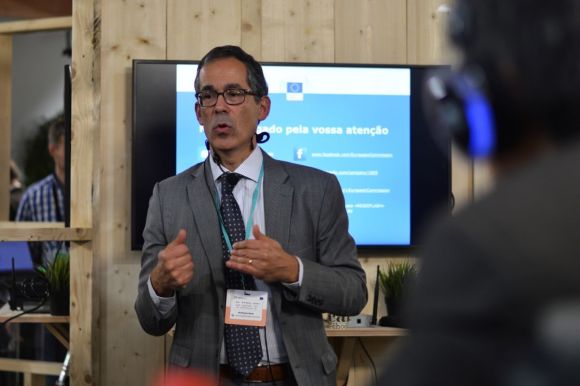
Armando Cardoso, from the European Commission, talked about the past and future of Portugal. Challenges like innovation and climate change were some of the subjects of this presentation.
Although it is a beautiful country with so much to offer, Portugal always looks like a big challenge to Europe. It depends mainly on the European funds, it contributes less than the other countries for the European funds and, above it all, it doesn´t grow that much. Along with the big economic crisis in 2010, Portugal’s growing levels have slowed down. However, we believe that things are changing.
Europe has been increasing its influence and much of it has to do with the Cohesion Policies applied. Cohesion Policies are created to reduce disparities between regions and to help them grow towards an equal level. Disparities are a big issue when it comes to Portugal, as it was said during this morning’s session. Although regions like Lisbon, Porto and Algarve still present some good levels, the rest of the country doesn’t - and that is a problem.
Major evolutions since 1975
In order to contextualize the actual Portugal situation, Armando Cardoso talked about some major evolutions that Portugal has made along with cohesion policies since the European Regional Development Fund.
- Decrease of child mortality rate;
- Decrease of analphabetism rate;
- Increase of high ways;
- Increase of drinking water distribution.
It is important to notice that Portugal lived hard times before this ERDF fund and these evolutions really show the importance of the European community. At the same time, it is important to know that Cohesion Policy has also helped increase the Employment rate since then and, for the future, EC expects to create more than 1 million jobs until 2023.
Multiannual Budget
Portugal will be working with a 7 year budget, from 2021 until 2027. This allows this member state to make a clear plan of the projects that will need European funds but still count on some economic changes that may happen along the way. Although this isn’t a position that has been cleared, Portugal expects to make plans for 5 years and then for 2 years, which allows a more efficient and realistic planning.
This budget has five strategic points:
- A more intelligent Europe- focused on industrial innovation;
- A greener Europe- focused on the transition into a cleaner energy, circular economy and the adaptation to climate changes;
- A more connected Europe- focused on regional mobility in matters of communication and information;
- A more social Europe- focused on the implementation of the European Social Fund;
- A closer Europe- focused on the promotion of the sustainable development of rural, coast and urban zones.
New on this programme, which is still on negotiations, is that Portugal will have to dedicate 75% of its funds to primary points: 45% for innovation and 35% for energetic transition.
Another new thing is that the EC wants to simplify administrative tasks to make things go faster. Reducing
bureaucracy might be a solution for those projects who take too long to be approved.
BREXIT and the decrease of the European fund
United Kingdom contributes with 15% of the European Fund, being this a huge part of the money. Along with BREXIT, the European funds for the next years will decrease and Portugal will also suffer with this.
For the 2021-2027 budget, Portugal will receive less 7% of the funds. Armando Cardoso says that this is not a “maleficent” step from the European Commission but a way to rise the effort of regions and cities towards some evolution.
The future?
The European Comission expects all this process to be finished by the end of 2020, so that by the 1st of January projects can start working. It is a very optimistic perception but, if it turns out to really happen in these terms, it will be a good situation.
Portugal still has lost of room to grow and this plan is a real proof of that. It will be needed a real effort and a lot of strength but the future might be better, as longs as we go for it.
Written by: Inês Pinto da Costa (Portugal)
Edited by: Iskra Tsankova (Bulgaria)



